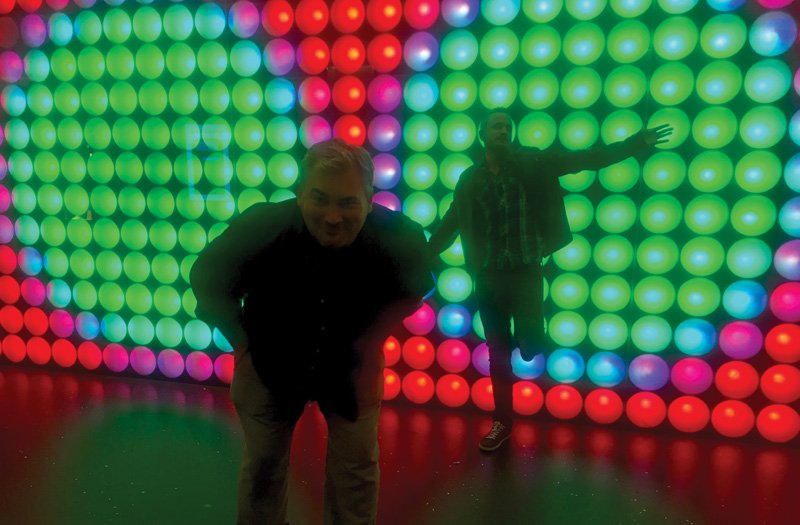+ By Leigh Glenn
The upstairs rooms at 53 West Street that house Haymaker Media are like a chrysalis just before the butterfly emerges. Despite the noise and dust from renovations, co-owner and director JR Mitchell, co-owner and producer Kevin Joy, and producer/host Conor Todd work with freelance audio designer Seth Donaldson and freelance photographer Conor Mitchell, adjusting lights and cameras in a small room graced with wall-sized paintings of Eartha Kitt, Billie Holiday, and Ella Fitzgerald by local artist Jeff Huntington. Soon the renovators will break, and the guys will record and shoot Jordan Sokel of Pressing Strings performing an original song, “Fold.” The shoot will be part of the 53 West music performance series that debuts in January 2018. With four cameras, a blend of interviews, and performances that include one cover song and three originals, the series and how they’ll handle the visual aspects reflects Mitchell’s penchant for perfection and is a way to connect with and support local musicians.
 Haymaker, which launched in mid-2016, is the newest evolutionary turn in the careers of Mitchell, who traded Hollywood for Annapolis nearly two years ago, and Joy, a DC-area native and grandson of the founder of the DC-based underground construction firm The B. Frank Joy Company. The two are attracting a mix of commercial and cyber-training clients while exploring ways to use and apply virtual reality (VR). In time, says Mitchell, they will add feature-length regular, 2-D films to their trade.
Haymaker, which launched in mid-2016, is the newest evolutionary turn in the careers of Mitchell, who traded Hollywood for Annapolis nearly two years ago, and Joy, a DC-area native and grandson of the founder of the DC-based underground construction firm The B. Frank Joy Company. The two are attracting a mix of commercial and cyber-training clients while exploring ways to use and apply virtual reality (VR). In time, says Mitchell, they will add feature-length regular, 2-D films to their trade.
Who Wants to be Marty McFly?
At about age 11, Mitchell, who grew up between Los Angeles and Seattle, was so inspired by the film Back to the Future that he started making camcorder movies with neighborhood friends the very next day and began steeping himself in movies. At 12, he saw The Exorcist—“I didn’t sleep for a while after, but the impact of some of those moments were what got me writing, early on,” he says. Mitchell knew he wanted to work in film. “I was the only kid that didn’t necessarily want to be [Back to the Future’s] Marty McFly,” he says. “I wanted to be the person that created that world.”
At 15, Mitchell interned at Seattle’s Prime Sports Northwest (now ROOT Sports), doing everything from shooting to assistant editing. He and Joy met in the film program at Southern Methodist University in Dallas. They became friends, roommates, and collaborators. “And then we tried to be [Akira] Kurosawa and made a record-breakingly long, 23-minute, silent student film,” says Joy. The exercise pushed students to capture visual references and mood without resorting to dialogue, and their film, about a broken romance and subsequent reflection, was supposed to be 16 minutes long. “It was very confusing,” says Joy, explaining how he and Mitchell learned how hard it can be to translate ideas onto film.
After college, Joy followed his father and grandfather into the U.S. Marine Corps before joining the family business, while Mitchell moved to Los Angeles to work on the first season of Big Brother before expanding into film and advertising. “Los Angeles is an intense place that you need a break from, and strange, in that people are most often not who they want to be yet, so there’s this stagnancy,” says Mitchell.
As Mitchell directed more, he realized he could work anywhere. He had just produced and edited a feature documentary, Satan and Adam, about Mississippi blues legend Sterling “Mr. Satan” Magee and his harmonica player Adam Gussow, and wanted to broaden his experience. Joy, then stepping into a leadership role, saw that something was lacking. “I missed my creative roots,” he says. “I wasn’t even painting as much, anymore, so I had a few whiskeys and called JR.”
From 2-D to VR
Today, Mitchell and Joy make commercials, training videos, and other projects, including some in VR. Unlike the 1980s, when enthusiasm for VR outpaced the technology, today the technology is there but people are skeptical. That doesn’t stop Mitchell, Joy, and Todd, who are keen to explore what’s visually possible. “We see [VR] as a new frontier that connects to what we love on a personal and creative level,” says Joy. “It’s turned into a bit of a gold rush, with a lot of big entities wanting to use the technology, but not knowing exactly how.”
The how presents a learning curve for people accustomed to working in 2-D. Tyler Vaillant, guitarist for local band Mountainwolf, approached Haymaker with a vision for the band’s song “Lord Reekis” to be set in a forest with dappled purple light. That meant that everything normally out of the cameras’ view in 2-D had to be concealed, and everyone on set had to hide behind trees while all the lenses—picture a cube-shaped camera with lenses on every side—picked up the action. Haymaker premiered the video at Rams Head On Stage. “The fans lost their minds,” says Joy.

Mitchell setting up Haymaker’s VR camera by the fountain at Karlsplatz, Munich, Germany. Photo by Kevin Joy.
Mitchell, Joy, and Todd hope to take VR users where they might never go: Munich during Oktoberfest, an underwater encounter with a blue whale, even experiences that elicit greater empathy. Earlier this year, Todd watched the VR film Across the Line, which puts viewers in the position of someone seeking services at Planned Parenthood and encountering protesters, including real verbal comments. “To have that experience become so intimate and personal, it left me in tears,” he says. “I couldn’t have known before how that might feel, but VR opened the door to the emotions in that situational context.”
Mitchell and Joy share a pioneering spirit. Their fathers are entrepreneurs. Joy says he’s always wanted to be, like his father, Ken, the kind of person who inspires others through his actions. “He’s thrilled right now,” says Joy of his father. “I don’t think he expected the level of work we’re doing.”
“His dad also inspires me,” says Mitchell. “I think it’s his world-class mustache,” he adds, no hint of jest. He looks up to his own father, Jim, who took risks and succeeded. “My dad has always been supportive, but talks to me about practicality,” says Mitchell. “It’s why I’ve always thought about business as well.” █







